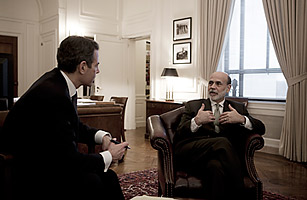
TIME's Managing Editor Richard Stengel talks with Federal Reserve Chairman Ben Bernanke during an interview in Washington, DC
(10 of 12)
Was that a good law?
It was repealed. I don't think that if that law had been in place it would have had much effect on this particular crisis. Investment banks manage to go bankrupt through their investment-banking activities, commercial banks manage to go bankrupt through their commercial-banking activities. It wasn't really the case that the combination was the major problem.
With that being said, more generally, there was a lot of financial innovation and change in the last decade or so, and our regulatory system did not keep up. So, credit default swaps are a good example. Credit default swaps were very completely regulated. They got AIG into serious trouble. They create lots of other problems. And one of the important objectives to perform is to better regulate derivatives like credit default swaps, and other kinds of esoteric financial instruments.
So, the general point that innovation and change made it difficult for the financial regulators to keep up with what was happening, that was certainly true. And one of the reasons to have a council, or some systemic oversight, is to have someone responsible for watching what's happening, and to recommend to Congress or to take action, if necessary, to address the implications of new instruments, new practices and new institutions.
I have one more personal question.
Yes?
You grew up in a small town in South Carolina, modest means, educated, studied money your whole life, studied, been around, now have the job overseeing more money than anybody in the world. You've been an academic and a public servant. You're not a wealthy man by the standards of the people you regulate. Here's a question, it's a populist question that many of our readers would want to know the answer to: Do bankers make too much money?
I think that bankers ought to recognize that the government and the taxpayer saved the financial system from utter collapse last year, and brought the financial system back to a situation where banks could operate something in a way close to where they did prior to the crisis. And in recognizing that, I would think that bankers ought to look in the mirror and decide perhaps that there should be some more restraint in how much they pay themselves, given the — what the government and the taxpayer did to protect the system.
But is there any sign that they recognize that?
Not too broadly, no.
And is there any reason to believe that they will? There is a reason they chose to become investment bankers.
Well, I think — so, let me first say that the Federal Reserve has instituted policies which we'll be enforcing on banks, which requires them to structure their pay packages in ways that align pay received with the performance given, that do not create excessive incentives for risk-taking and, therefore, don't promote financial instability, like some of the pay packages did prior to this. So, we are going to be looking at that as part of our supervision of banks.
Because, after all, Goldman Sachs and Morgan Stanley did become banks. Right? They became national banks.
They became holding companies because they own banks.
They paid the money back, but they became bank holding companies, so they are regulated in some way by the Fed. Right?
Yes. So, in the longer term, I think if we had these tools to get rid of too-big-to-fail, which I think is an enormous problem. I want to be very, very clear, too-big-to-fail is one of the biggest problems we face in this country, and we must take action to eliminate too-big -to-fail.
One of the strongest things we can do to eliminate too-big-to-fail is create this special bankruptcy regime that would allow us to unwind a failing systemic and critical firm in a way that doesn't destroy the financial system. If you have this mechanism, then all banks, not just small ones, would be subject to market forces. And that, in turn, I think, would impose more discipline on pay packages over a period of time. But we don't have that yet. And right now, we have a situation still where the government is either directly or indirectly providing some protection or help to many large financial institutions. And with that recognition, I think that bankers ought to exercise some restraint in their pay decisions.
Are you saying that time for fiscal and monetary stimulus is over? And, if so, what's the downside of pushing even harder?
There are not easy solutions. It's an enormous problem. I think the Federal Reserve — one direction that we can go is to continue to encourage the extension of credit, small businesses, in particular, create a lot of jobs, particularly during economic recoveries. And we have lots and lots of evidence and anecdotes suggesting that small businesses are particularly harmed by the tightness of the bank lending standards and unavailability of credit. So, everything we can do, and that the Administration and Congress can do, to support credit extension to all business, but primarily small business, would be a very powerful.